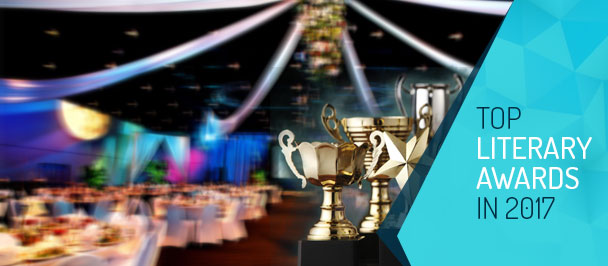This blog was posted on August 15, 2017.

The literary awards, as they stand today, have come a long way since its inception. The earliest literary awards, given away in the 19th century, organized mostly in the US or UK. The nominations for the awards were decided by the commercial success of a book or the author’s overall publicity. The literary awards gradually became popular in other parts of the world, like Europe, new worlds like Australia and New Zealand, and much later Asia Pacific. However, the focus was always on the galaxy of literary luminaries, who were already established names with best sellers coming up every year from renowned publishers.
It was much later, in the late nineties, that the writers who wrote for the mass, and were a part of the common folk came to be recognized. The new millennium brought with it shifting paradigms and change of thought. The last few decades have seen a tremendous surge in the number of young awardees; for their first published works, or even translations. Many get noticed for the uniqueness of their subject matter or the socialist intent of the work. The idea is to welcome new ideas, nurture new progenies, and conquer the hitherto unexplored territories of human understanding. The need for young blood has led to the creation of new award categories, that also recognize publishers and designers for exemplary contributions.
Though originally a product of the western mind, the wave of literary awards has touched Oriental shores too, to honor its multi-cultured literature.Today we have a host of literary award programs in Middle East, South East Asia, and Far East, in addition to prestigious awards given away to writers in US and Europe, such as Nobel Prize, Booker Prize, Pulitzer prize, National Book Critics Circle Award, and Newbery Medal. Many new organizations and sponsors are ready to fund award ceremonies and workshops for young talents. The YoungAuthor Awards, organized by The Write Scene, is one such appreciable initiative to recognize and promote young and promising writers. Here, we take up some well-known literary awards for honoring global talent, as well as awards with region or culture-specific focus, and awards that reward women’s literature.

The Pulitzer Prizes and Fellowships are awarded for remarkable achievement in newspaper, magazine and online journalism, literature, and musical composition in the United States. It was established in 1917, by Columbia University by the will of the first Joseph Pulitzer. The prize or fellowships are awarded by the University on the recommendation of the Pulitzer Prize Board. There are 21 categories in Pulitzer Prizes, across journalism, books, drama and music. In twenty of the categories, each winner receives a certificate and a US$15,000 cash award (raised from $10,000 in 2017). The winner in the public service category of the journalism competition is awarded a gold medal.The Pulitzer Prizes in Journalism are awarded in fourteen categories.
Only Entries made by any individual from a United States newspaper, magazine or news site are eligible. United States citizenship is not a prerequisite for the Pulitzer Prizes in Journalism. In the Fiction category, Biography, nominated authors for Poetry and General Nonfiction categories, must be United States citizens. In the History category, the author may belong to any nationality. But, the book must be about the history of the United States.
| Category | Book/Title | Author |
|---|---|---|
| Fiction | The Sympathizer (Grove Press) | Viet Thanh Nguyen |
| Drama | Hamilton | Viet Thanh Nguyen |
| History | Custer's Trials: A Life on the Frontier of a New America | T.J. Stiles (Alfred A. Knopf) |
| Biography or Autobiography | Custer's Trials: A Life on the Frontier of a New America | T.J. Stiles (Alfred A. Knopf) |
| Poetry | Ozone Journal (University of Chicago Press) | Peter Balakian |
| General Non-fiction | Black Flags: The Rise of ISIS (Doubleday) | Joby Warrick |
| Music | In for a Penny, In for a Pound (Pi Recordings) | Henry Threadgill |
You may look up at http://www.pulitzer.org/ for more details on the Pulitzer Prize.

The Baileys Women's Prize for Women’s Fiction is one of the most renowned literary awards given away in UK. It was previously known as Orange Prize for Fiction (1996–2006 and 2009–12) and Orange Broadband Prize for Fiction (2007–08). Baileys Women's Prize for Women’s Fiction is awarded to female writersfor the best original full-length novel written in English and published in the United Kingdom in the preceding year. Set up in 1996, the Baileys Women's Prize for Women’s Fiction is aimed at rewarding women fiction writers for their outstanding contribution in the art of fiction writing and storytelling.
The competition is open to women writers of all nationalities across the world. the list of nominees for the award is announced every year, in the month of March. The shortlisted novelists are announced in June, and the winner is declared a few weeks later. The winner of the Baileys Women's Prize for Women’s Fiction is selected by a board of "five leading women" every year.The winner of the Baileys Women's Prize for Women’s Fiction receives £30,000, along with a bronze sculpture called the Bessie created by artist Grizel Niven, the sister of actor and writer David Niven.
Lisa McInerney won the Baileys Women's Prize for Women’s Fiction 2016 for her debut novel The Glorious Heresies.You may log on to http://www.womensprizeforfiction.co.uk/ for more updates on the workshops, literary discussion, festivals, and awards.

Commonwealth Writers, a cultural initiative of the Commonwealth Foundation, was set up in 2012 to recognize and honor writers across the commonwealth nations in Asia, Africa, Canada and Europe.
Commonwealth Writers presents two awards: Commonwealth Book Prize for the best first book and Commonwealth Short Story Prize for the best short stories. The prize money for Commonwealth Book Prize is £10,000 for the overall winner and £2,500 for the regional winners. The winners of the Commonwealth Short Story Prize for the best short stories are awarded £1,000 and the overall winner receives £5,000. The Book Prize is discontinued. The Short Story Prize by Commonwealth Writers aims at rewarding writers of both English and regional fiction, such as Bengali, Chinese, Kiswahili, Malay, Portuguese, Samoan and Tamil.
Parashar Kulkarniwas awarded the 2016 Commonwealth Short Story Prize for his story Cow and Company. Log on to http://www.commonwealthwriters.org/ for more news and opportunities on Commonwealth Writers.

The S.E.A. Write Award, or Southeast Asian Writers Award, as it is more commonly known as, honors leading poets and writers in the ASEAN region. The ten countries in the ASEAN region are Brunei, Cambodia, Indonesia, Laos, Malaysia, Myanmar, The Philippines, Singapore, Thailand, and Vietnam. The award ceremonies are held in Bangkok, with a member of the Thai royal family presiding. The S.E.A. Write Award was conceived by the management of The Oriental hotel in Bangkok. The award ceremonies have featured renowned guest speakers like Iris Murdoch, Peter Ustinov, Jeffrey Archer, James A. Michener, Gore Vidal, William Golding, Rita Dove and Paul Theroux.The S.E.A. Write Award includes a cash prize, a memento, and a guided tour of the local tourist attractions.
The S.E.A. Write Award is usually given for a specific work by an author, or lifetime achievement. The award considers all kinds of non-political literary works (including poetry, short stories, novels, plays, folklore, and scholarly and religious works) for nomination. The literary works may be in any language used within the boundaries of the awardee’s country.Veeraporn Nitipraphawon the 2015 S.E.A. Write Award for her debut novel Saiduean Ta Bod Nai Khaowongkot (Blind Earthworms in a Labyrinth).
The winners of 2016 are yet to be announced.For more information log on to http://seawrite.com/.

The Middle East Monitor (MEMO) organizes Palestine Book Awards every year. The prestigious event, which began in 2012, now in its sixth year, honors and celebrates literature, research work, and poetrywritten in English about Palestine. Palestine Book Awards is a great opportunity for publishers to produce more books on Palestine and rewarded for their efforts.
The award ceremony allows writers to interact with audiences, discuss their work with other writers and publishers. It offers a platform for them known and appreciated as writers of a niche segment.Nominations for the Palestine Book Awardsare opened in January, every year. It has three categories: Academic, Memoir and Creative. Around 6-7 books are chosen for recognition. The books are chosen by a panel of judges including eminent writers like Haifa Zangana, Dr. Faysal Mikdadi, Dr.Ibrahim Darwish, Alan Waddams, and Subhi Hadidi.
The month of November sees two events to honor the shortlisted authors. The first event is a discussion on the book at an Open House hosted by Professor Eugene Rogan of St Anthony's College, Oxford. The second event is a dinner by invitation where the names of winners are announced andthe awards given away. The gargantuan dinner brings together guest writers interested in Palestine.The 2016 winners of Palestine Book Awards were: Academic Award (joint winners):Lorenzo Kamel – Imperial Perceptions of Palestine (I.B. Tauris) and Anaheed Al-Hardan – Palestinians in Syria (Columbia University Press); Memoir Award: Yasir Suleiman – Being Palestinian (Edinburgh University Press); Creative Award: Ramzy Baroud, Samah Sabawi & Jehan Bseiso – I Remember My Name (Novum Publishing).
The year 2017 has seen a total of 41 submissions for consideration. Log on to https://www.palestinebookawards.com/ about for more information on Palestine Book Awards.

The International Prize for Arabic Fiction (IPAF) managed in association with the Booker Prize Foundation in London, and supported by the Emirates Foundation in Abu Dhabi, is aimed at recognizing Arabic writing in fiction. It also encourages translation and promotion of Arabic literature into other world languages, and thereby promoting Arabic literature in the global arena. The International Prize for Arabic Fiction is specifically targeting at recognizing Arabic prose fiction by Arabic authors.An independent board of trustees, comprising of representatives from Arab world and other nations, is responsible for appointing six new judges each year, and overall management of the prize.IPAF supports other literary initiatives like Nadwa (writers’ workshop) inaugurated in 2009 for budding fiction writers in Arabic.
IPAF accepts applications for the literary novel only, not short stories, collections of poetry or drama. The submitted novel must be written in Arabic. Arabic translations of a book originally written in any other language are not eligible for the International Prize for Arabic Fiction.
The winner receives US$50,000 and the six other shortlisted authors receive US$10,000 each.A Small Death by Mohammed Hasan Alwan was announced as the winner of the 10th International Prize for Arabic Fiction (IPAF) on Tuesday 25 April 2017.The 2016 winner was Rabai al-Madhoun for his book Destinies: Concerto of the Holocaust and the Nakba.
You may log on to http://www.arabicfiction.org/en/about-the-prize for more details on the International Prize for Arabic Fiction.

The Albert Hourani Book Award, established in 1991, honorsauthors for excellence in publishing literary and research works in Middle East studies. The award is named after Albert Hourani to recognize his remarkable contribution to society as a distinguished teacher and mentor. The Albert Hourani Book Awardrecognizesnon-fiction scholarly monographs only, based on original research published in English. The subject matter of the published work should focus upon Middle East.
The winner of Albert Hourani Book Award receives $1000 and a certificate of award. Honorable mentions also receive a certificate of award. Winners are announced at the Awards Ceremony at MESA's 51st annual meeting in Washington DC, followed by an announcement on MESA's website. In 2016 Nükhet Varlık won the Albert Hourani Book Award for his research work on Plague and Empire in the Early Modern Mediterranean World: The Ottoman Experience, 1347-1600. Her research work was published by Cambridge University Press. For more information log on to http://mesana.org/awards/albert-hourani-book.html.

The Write Scene, an online portal, aimed at recognizing and encouraging young writers, is organizing the First International Young Author Awards 2017 in Dubai in October. According to Deeba Salim Irfan, the founder(who is a brand expert, writer, poet and an entrepreneur), the award intends to nurture, honor, and represent young talent, under the age of 30, in the global literary circuit. The advisory board for Young Author Awards 2017, has Fatma Buti Al Mheir (Chairwoman of Dubai Quality Group and Director – Investment & CSR at Community Development Authority under Dubai Government), Padma Shri Keki N. Daruwalla (Indian poet and writer in English, recipient of Sahitya Akademi and Padma Shri awards), Mita Kapur (founder and CEO of Siyahi, India’s leading literary consultancy).
The Young Author Awards 2017, one of its kind, has two categories: Book Awards and Creative Awards. The sub categories under Book Awards are: Young Author, Future Find 9youngest published author by age) and Publisher of the Year. The Creative Award has the following categories: Best Cover Design, Bookstore of the Year, Most Creative Book Launch, Innovative Social Media Usage, Innovative Book Launch Strategy, Best PR Campaign for a Book Launch, Ambient Media for a Literary Purpose, and Out-of-the Box Concept for Nurturing Young Authors. Nominations for this year are closed and awards will be announced in October in Dubai.
Block your calendar today if you want to attend the Young Author Awards ceremony. Log on to http://www.youngauthorawards.com/ for more information on the awards.